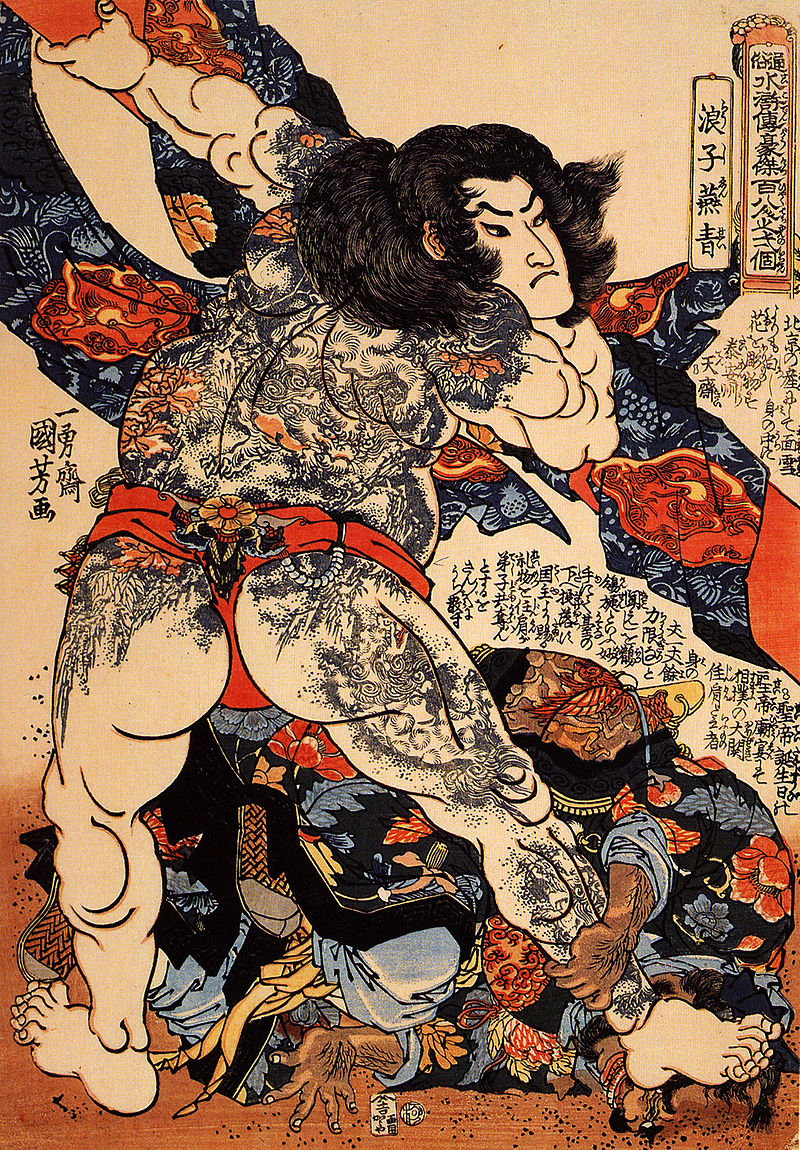aNewDomain — Animals undoubtedly feel pain, and clearly suffer.
— Animals undoubtedly feel pain, and clearly suffer.
Is there a difference between the suffering of animals and the suffering of humans?
If so, that difference is in mentation. Reflection, cognition, self-awareness, call it what you what: it’s the ability to understand pain, to ruminate on the experience of pain and, possibly, to find meaning in it.
Humans can suffer voluntarily.
In Buddhist mythology, for example, the saint is a person who has found the path to enlightenment – the way off the wheel, out of life and into infinity. Freedom from suffering. And, having found it, the saint has elected to be reincarnated again in order to teach the way to us mere mortals, the unenlightened. The person has chosen suffering over non-suffering for the cause of spreading non-suffering.
We material beings, though, choose suffering for all sorts of more mundane reasons. To fit in: tattoos and ear piercings (or other kinds of piercings) mark us as part of the in crowd. Some kinds of tattoos mark us as the alienated, the out crowd – but isn’t there an in nature to out?
The self-alienated prefer loneliness to company, disaffection to good cheer. Isn’t this at least partially voluntary suffering?
Don’t you go to the gym to suffer for the causes of long life and acceptable pants sizes? Or do you diet? Choose hunger and delayed gratification for the cause of slimmer hips, better definition.
Yeah, we suffer voluntarily for all kinds of reasons. Good ones, stupid ones, shallow and death-denying ones.
Animals can’t suffer voluntarily.
They can suffer, this much is clear. But it is difficult to make a case that an animal is ruminating on its pain, struggling to find the sense or the meaning in suffering, endeavoring to suffer bravely or well. Animals merely suffer. Wordlessly, unapologetically, unabashedly. Openly. Sometimes it is difficult for them to communicate to us that they are in pain. Sometimes their behavior indicates it, sometimes it bothers us but fails to communicate anything at all.

Humans live quite a long time under the right sorts of conditions. At the end of it all, we have these decisions to face: whether to attempt to live longer, to bear up under the pains of grief and loss and medicine, or to choose the sufferings of untreated illness and lapse into death. To slip away or storm off, however it happens. Ideally, we get that choice. More realistically, our families are burdened with it.
And then they make the choice, sometimes, selfishly.
Families want to minimize their potential guilt and shame, delay their own grief. Or accelerate that grief, get it over with, hack away at the Gordian Knot.
A living will can take some of this burden away. Advanced directives and do-not-resuscitate orders can all help us enact our freedom, keep us responsible, keep such burdens from the backs of our loved ones.
Living so long, we share our lives with pets whose lifespans are usually radically shorter than our own. We have to make these end-of-life decisions for them because they can’t. They cannot decide in any way we can recognize and, if they have decided in a way we don’t understand, cannot communicate such a decision to us.
They experience the desire to live, to fight for life. Maybe also a recognition of futility, a desire to lay down and rest, or maybe only the behaviors of a lost fight, of exhaustion. But they cannot choose to engage with medical treatment even to a level that a child can.
Cats won’t take pills. You have to force them. A child might not like their shots or their pills or their bitter medicine but children can be reasoned with, can at least grow into the reasons you gave them when they were too small to really comprehend. Your pets never will.
And so we, mere mortals, are left with these decisions. How old is your pet? How much will she suffer untreated? How much suffering will treatment produce? Will she hate me for giving her these shots or these pills? What will her quality of life be like? How much longer can she live?
Should I have her euthanize d?
d?
Is this mercy?
I was at the vet today with my cat and all these questions. The cat is 17 years old. She joined the family right at the start of my marriage.
We measure our years together in terms of the age of the cat. She’s never liked us, not really. She’s always been standoffish, shy, fey. Always been medically somewhat complex. And now they’re saying that she has more conditions than it makes sense to treat. Some conditions brought on by treatments.
What shall we do now, at the tail-end of her time on Earth? End this treatment to stop one kind of suffering, but endure suffering of another kind? End her life completely? Continue to treat problems that will never resolve, with no hope of restoring youthful functioning?
She can’t know these things are happening to her, or participate in the decisions. She can’t find any meaning in her kidney disease, her thyroid condition, her arthritis, her tooth decay, her tachycardia, her entropy. She finds no meaning in being held down and forced to ingest medicine.
On the way out, tears on my face, I saw a family with a young dog. They said she was three and had cancer. They were going to try to treat it. Still a lot of years of potential left for that dog who still is almost a puppy.
Cutest dog I ever saw.
Life. Life, so full of dangers and risks.
Living is a risky endeavor, to be sure. Dying, now, there’s nothing to it. Nothing happens to dead people, de ad animals. Not suffering, not joy, not relationships, certainly not meaning. But life, with its risks of love and loss, its danger of meaning and purpose that require suffering, life is a fraught and fragile thing.
ad animals. Not suffering, not joy, not relationships, certainly not meaning. But life, with its risks of love and loss, its danger of meaning and purpose that require suffering, life is a fraught and fragile thing.
Cats and dogs and parrots and horses, they don’t get to choose. We carry that burden, for better or for worse. But we can choose. Right here and now, we get to choose. You can’t choose not to suffer, now, but sometimes you get to pick what flavor of pain you get.
And you also get to choose this: whether to suffer for something, or to suffer for nothing. To suffer for banal reasons or grand ones. To live with a purpose or to meander through life regretting the dead, regretting your own eventual death.
For aNewDomain, I’m worm food that has, so far, outrun the worms, otherwise known for now as Jason Dias.
Image one: By Uploadalt (Own work, photographed at Musee Guimet) [CC BY-SA 3.0, via Wikimedia Commons); image two: “Roshi Ensei lifting a heavy beam”. Licensed under Public Domain via Wikimedia Commons; image three: “BradburyHospice” by Chong Fat – Own work (Self took photo). Licensed under Public Domain via Wikimedia Commons; image four: By Emiichann (Own work) [Public domain], via Wikimedia Commons.












